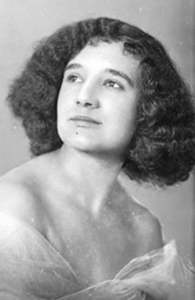
Gwendolen Avril Coleridge-Taylor
*Gwendolen Avril Coleridge-Taylor was born on this date in 1903. She was a Black English pianist, conductor, and composer.
She was born in South Norwood, London, and was the daughter of composer Samuel Coleridge-Taylor and Jessie Walmisley. They had met as students at the Royal College of Music. She had an older brother, Hiawatha. Gwendolyn wrote her first composition, Goodbye Butterfly, at age twelve. Later, she won a scholarship for composition and piano at Trinity College of Music in 1915, where Gordon Jacob and Alec Rowley taught her.
In 1924, Coleridge-Taylor married a white Englishman, Harold Dashwood, in the Croydon parish church. She composed and conducted using her maiden name. After their divorce, she dropped her first name and went by Avril professionally.
In 1933, Coleridge-Taylor debuted as a conductor at the Royal Albert Hall. She was the first female conductor of H.M.S. Royal Marines and a frequent guest conductor of the BBC Orchestra and the London Symphony Orchestra. She was the founder and conductor of the Coleridge-Taylor Symphony Orchestra and its accompanying musical society in the 1940s and the Malcolm Sargent Symphony Orchestra. In 1939, she moved to East Sussex, where she had views over the South Downs.
Her compositions include large-scale orchestral works, songs, keyboard, and chamber music. They include a Piano Concerto in F minor, To April (1929), the Spring Magic suite (1933), Sussex Landscape, op 27 (1936), From the Hills, In Memoriam R.A.F., Wyndore (Windover) for choir and orchestra, and the Golden Wedding Ballet Suite for orchestra. Wyndore, composed in Alfriston in 1936 and inspired by an Aldous Huxley poem ("I have tuned my music to the trees"), is a seven-minute song without words.
Coleridge-Taylor had a tour of South Africa in 1952 during apartheid. Originally, she was supportive of, or neutral to, racial segregation; she was taken as white as she was at least three-quarters white in ancestry. When the government learned that she was one-quarter Black, it would not allow her to work as a composer or conductor. In 1957, Coleridge-Taylor wrote the Ceremonial March to celebrate Ghana's independence.
Later in life, she wrote a biography of her composer father, The Heritage of Samuel Coleridge-Taylor (London: Dobson, 1979). The book includes her life and memories of her father. She also published compositions under the pseudonym Peter Riley. Gwendolyn Coleridge-Taylor died in a nursing home in Seaford on the Sussex coast on December 21, 1998.